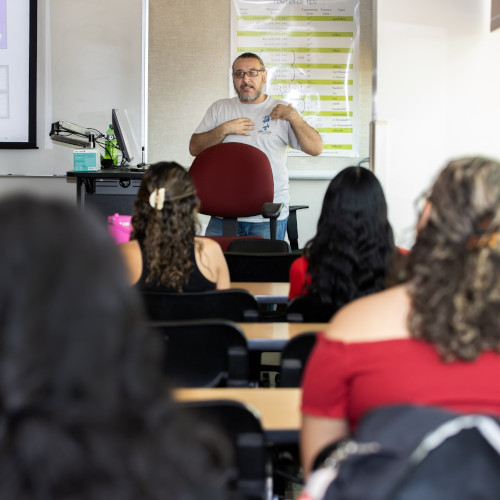To enhance financial transparency, California State University, San Bernardino offers an interactive financial transparency tool, featuring dashboards related to the University Operating Fund and other campus budgeted funds. Faculty, staff, students, and community members can access CSUSB financial information on the website 24/7.
2025 - 2026: Where we are
Understanding Our Budget
CSUSB Operating Budget is comprised of State General Fund appropriation and tuition & fees. Our primary cost drivers are salaries, benefits, financial aid, risk management, utilities, and other essential campus costs.


Access the Financial Transparency Portal
Maintaining fiscal data on the portal will enable CSUSB to provide campus and external users the ability to:
- View financial data from various University activities in graphical format.
- View budget/revenue from various sources and how it is expended by fund, division, department or activity type.
- View historical budget/revenue and expenditure trends over time.
CSU San Bernardino’s finances are structured on a fiscal year basis beginning on July 1st. The portal contains 5 years of data, including the current fiscal year. If you have suggestions for the portal, please provide your feedback.
Supplemental resource links are available below.
If you have any questions, please feel free to contact the University Budget Office via email at budget@csusb.edu.
What our Community is Asking
The deficit is caused by several factors:
- Unfunded compensation increases: About 71% of employee general salary increases for FY 23/24 and 24/25 were unfunded by the state, leading to a $15 million impact on CSUSB’s budget.
- Mandatory expense increases: Include significant rises in health care rates (11%) and insurance premiums for liability and property (21%), which were not fully covered by general funds. Additionally, rising utility rates are further driving costs up.
- Declining enrollments: Fewer new students and lower retention rates since FY 2022-2023, which led to revenue loss.
- Inflation: General inflation has driven up operating expenses.
CSU system anticipates even greater budget challenges through FY 2025-2026 and beyond, with potential state funding cuts and deferrals through 2027-2028. The situation may persist for several years.
All divisions will be impacted, particularly through:
- Reductions in state-funded travel expenses.
- Cuts in discretionary expenditures.
- Reduced budgets for equipment and furniture (OE&E).
- Changes to course offerings and class sizes.
- Reductions in faculty reassigned time for committee work and sabbaticals.
- Consolidation of administrative and academic programs/units.
No. The focus is on cost-saving measures and reductions in expenditures rather than selling or divesting assets.
It is unlikely, given the current trend of declining enrollments. The university is facing revenue losses due to fewer new students and lower retention, which contradicts the possibility of growth mitigating the deficit. There might also be limitations on expanding programs or services under the current financial constraints.
Generally, waitlists help manage demand for popular courses, allowing institutions to gauge student interest and adjust offerings accordingly. Waitlists are not inherently indicative of overall enrollment or macrolevel trends in student matriculation. Regarding the number of classes offered, student success remains our priority, and any reductions in course offerings should not impede student access to courses necessary to progress academically. With that understood, with an emphasis on schedule efficiency, fewer course sections may be offered, and course sizes may be adjusted because of current budget constraints.
The university’s budget mitigation strategies may involve cutting costs related to instructional personnel, which would disproportionately impact our lecturers. With fewer classes being offered and changes in course sizes, lecturer faculty could see a reduction in available teaching assignments. Any impacts to instructional personnel will be managed in accordance with the CFA Collective Bargaining Agreement’s provisions on appointment and assignment order.
There will be a careful review of all positions, including management roles. The duration is uncertain but could persist through FY 2025-2026 as the budget situation worsens.
Critical or high-priority roles may still be filled depending on the strategic needs of the university.
The salaries of all employees significantly impact the university’s recurring costs. While CSUSB received some additional funding for mandatory expenses, such as salary increases, the funds allocated by the state falls short of covering the full costs. This shortfall means that even though the raises are necessary and deserved, they are a significant contributing factor to the budget deficit because they represent costs that outpace the funding provided to CSUSB.
The administration has made significant efforts to keep faculty and staff informed about budget matters through multiple channels:
- Financial Transparency Portal: This platform provides access to detailed budget information and updates.
- Faculty Senate Meetings: Several meetings with the Faculty Senate Executive Committee to discuss the budget situation.
- University Budget Advisory Committee (UBAC): This committee includes representatives from across campus who review budget allocations and provide input.
- Campus-Wide Emails: These updates include information on budget changes, decisions, and future projections to ensure transparency.
Moving forward, CSUSB plans to continue these communication channels and enhance accessibility to financial information. The goal is to maintain transparency and engagement with all faculty and staff.
CSUSB allocates funding across various areas that, while not strictly academic, contribute to the overall student experience and campus environment:
- Campus Maintenance: Clean and well-maintained facilities and grounds create a welcoming environment that supports student well-being and success.
- Student Wellness and Support Services: Mental health, disability support, and wellness services are critical for student success and retention.
- Extracurricular Activities: Clubs, events, and other student activities enrich campus life, building a sense of community and engagement that promotes learning outside the classroom.
Additionally, certain funds are designated for specific uses. For instance, self-support programs and student fees, such as those for health services and student success initiatives, are legally restricted to their intended purposes and cannot be redirected to other areas, such as academics. Allocating resources across these areas creates a balanced environment that holistically supports students’ academic and personal growth.
All layoff decisions and budget cuts are made in compliance with the Collective Bargaining Agreement (CBA) and are driven by the need to maintain essential student services and operations. The administration conducts thorough assessments to identify the areas where cuts will have the least impact on core academic functions and student success. Factors considered include:
- Impact on student services and retention
- Preservation of instructional quality and faculty support
- Operational efficiency and campus functionality
This approach aims to ensure that layoffs and budget reductions are implemented thoughtfully, minimizing disruption while addressing the university’s financial constraints.
The budget shortfall results from several unforeseen factors, including rising inflation and unfunded mandates from the state. While CSUSB has made extensive efforts to mitigate these impacts, the current reserve levels are not sufficient to cover the entire deficit sustainably. CSU’s reserves currently cover approximately 34 days of operation, well below the recommended three-to-six-month operating reserve buffer. Using these reserves to cover recurring expenses, like salaries, would only provide temporary relief and could compromise the university’s financial stability in the long term.
CSUSB’s Management Personnel Plan (MPP) count is generally consistent with or slightly below the CSU system average. For example, CSUSB’s MPP-to-instructional faculty ratio is 1 MPP for every 7.2 faculty members, while the CSU system average is 1:6.3, and the MPP-to-student (FTES) ratio is 1 MPP for every 97.5 students, which aligns closely with the CSU average of 1:82. MPP salaries are set according to CSU policies, which ensure that compensation remains competitive and in line with comparable institutions. Each MPP role undergoes periodic review to confirm that it contributes effectively to campus operations and supports CSUSB’s mission of student success. The university strives to maintain a lean administrative structure to optimize resources for instructional and student support services.
CSUSB is dedicated to comprehensive student support that promotes both academic and personal success. Key support services include:
- Academic Advising: Advisors help students with course planning, career guidance, and degree completion strategies.
- Services to Students with Disabilities (SSD): The SSD office provides accommodations and resources for students with disabilities to ensure equitable access to learning.
- Black Student Success Initiative: This program supports Black students by providing mentorship, community-building activities, and resources tailored to their needs.
- Counseling and Psychological Services (CAPS): CSUSB offers mental health services to help students manage stress and challenges that may impact their academic performance.
- Financial Aid Guidance: Financial counselors provide support with financial planning, scholarships, and navigating financial aid to reduce barriers to education.
These services are part of a holistic approach to student success, aiming to equip students with the resources they need to thrive both academically and personally at CSUSB.